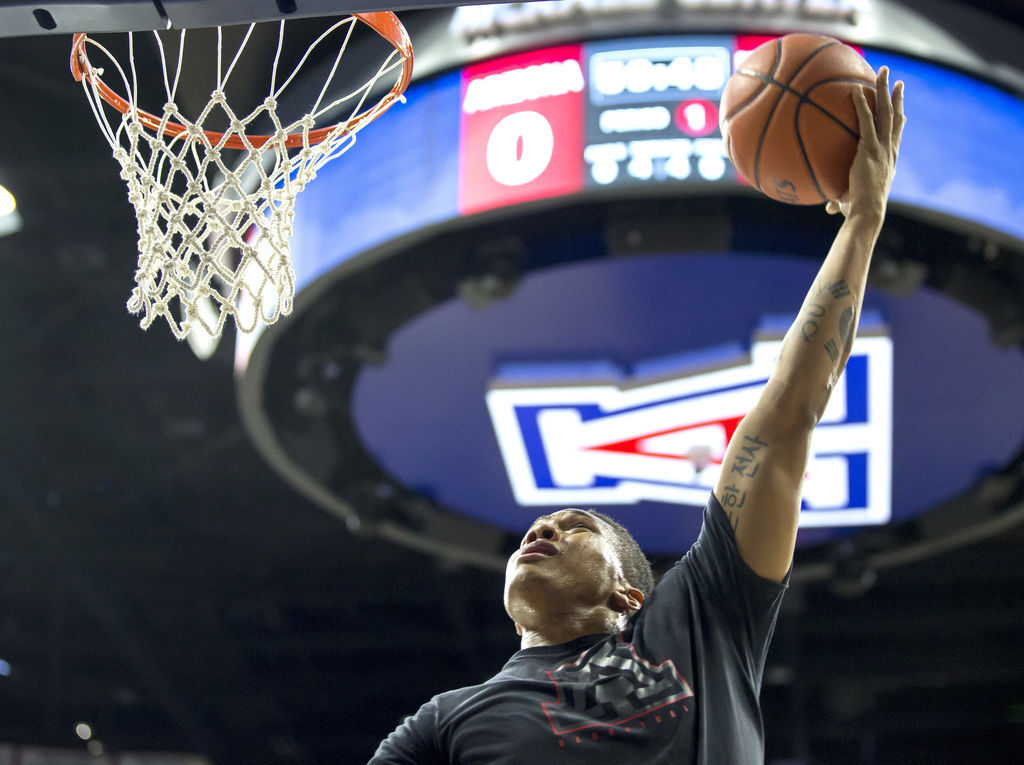The NCAA pushed back the start of the 2020-21 college basketball season just 15 days to Nov. 25, and Arizona and its Pac-12 rivals may still be able to join in.
The conference, which announced last month that all sports competition would be paused until at least January, did not address basketball specifically after the NCAA Division I council voted Wednesday to start basketball season on the day before Thanksgiving.
But in a statement that was not sport-specific — even though it appeared to mostly concern football — Pac-12 Commissioner Larry Scott indicated that the conference was pursuing a pathway to a quicker start.
Scott said the governors of Oregon and California, the two states with the most severe restrictions on activity within its footprint, have now made it clear there are no state restrictions forbidding play.
The Pac-12 also announced earlier this month the impending availability of daily COVID-19 testing, alleviating another concern that led to the conference’s initial decision.
So from here, it could be just a matter of ironing out any local issues.
“Our California and Oregon universities will now each individually and immediately reach out to their relevant county public health officials to seek clarification on what is required to achieve the same clearance to resume contact practice and competition,” Scott said.
The NCAA made its decision to go ahead with a Nov. 25 start date in part because it said three-quarters of U.S. colleges are asking students to leave campus before Thanksgiving and either go straight into winter break or finish fall exams remotely.
Without students on campus, sending teams to small bubbles around the country is easier to justify, while the campuses themselves would theoretically be less likely to have COVID-19 spread.
“The new season start date near the Thanksgiving holiday provides the optimal opportunity to successfully launch the basketball season,” NCAA senior VP of Basketball Dan Gavitt said in a statement. “It is a grand compromise of sorts and a unified approach that focuses on the health and safety of student-athletes competing towards the 2021 Division I basketball championships.”
But even if the Pac-12 allows basketball teams to begin play Nov. 25 along with nearly everyone else in Division I — the Ivy League is the only other conference that has banned play before January — it isn’t clear how Arizona’s schedule will shrink.
The NCAA said it will now allow teams a maximum of 27 games and a minimum of 13 to be considered for championship eligibility, with at least 13 games coming against Division I competition. Women’s basketball teams will be allowed to play 23 games plus up to four games in a multi-team event or play 25 games without being in one.
Arizona originally had 31 games scheduled — 20 in the Pac-12, nine single nonconference games and two games in the NIT Season Tip-Off, which is reportedly being moved from Brooklyn to Orlando. If all four of Arizona’s pre-Nov. 25 games are simply lopped off the schedule — home dates with NAU, Northern Colorado, Loyola Marymount and Wyoming — the Wildcats would be sitting right at the new maximum of 27 games.
But it’s also unclear whether any games after Nov. 25 might remain scheduled as is, if regionalized pods of nonconference games might form instead — or if Pac-12 teams would go straight from multi-team events into conference play.
As of now, the Wildcats’ December schedule includes marquee matchups against Gonzaga and Illinois, along with Pac-12 games against Colorado and at Stanford, plus nonconference home games with Bakersfield, Cal Baptist and Montana.
Ryan Reynolds, the UA’s director of basketball operations, said after the NCAA’s announcement that it might take a week or so for answers about nonconference play.
In its decisions Wednesday, which also included extending the in-person recruiting ban to Jan. 1 and forbidding competition on the Election Day, the NCAA recommended a minimum of four nonconference games for basketball.
Playing nonconference games is believed to be critical to the NCAA seeding process, allowing the committee to better measure teams in different conferences, though college basketball analytics guru Ken Pomeroy said viable comparisons can be made without them.
Meanwhile, because of the Nov. 25 starting date, full basketball practices of up to 20 hours per week will now begin on Oct. 14. The NCAA also added an “interim” period of extended preseason practices starting Monday that will allow 12 hours per week instead of the standard eight hours allowed in offseasons.





